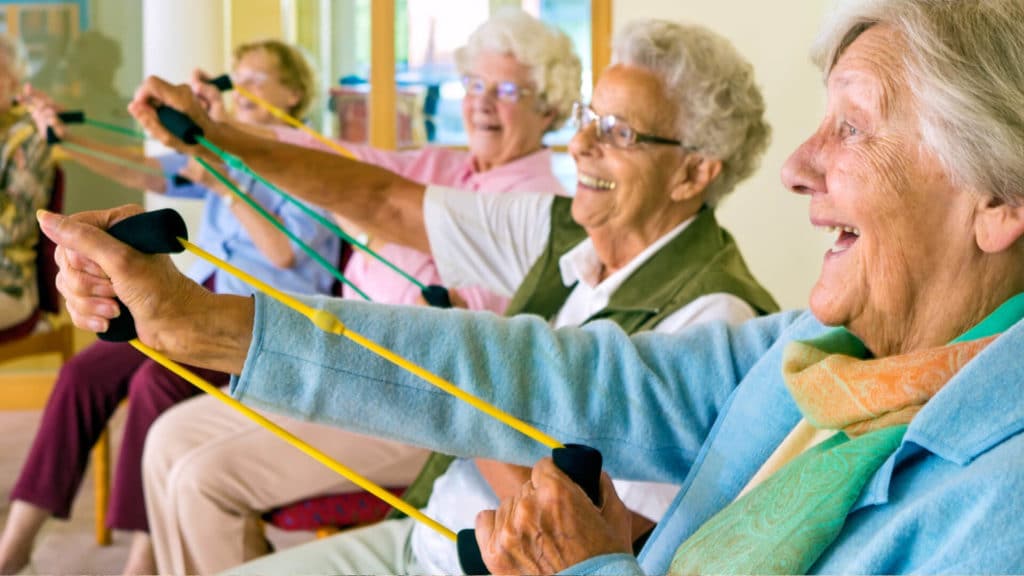What does an active retirement mean to you? To 75-year-old Jerry Quill, it means playing ice hockey. For 62-year-old Chuck Melin, the senior years are a fine time for steer-wrestling. A generation ago, the dominant image of seniors was a kindly, old grandmother knitting in her rocker as Grandpa watched TV or took a snooze. This isn’t your grandparents’ retirement. The independent living community of today recognizes that seniors are doing more, growing more, and living longer than ever before.
Ageism is alive and real. Most seniors can share at least one story of condescending young people or doctors who underestimate their abilities. It’s no wonder so many worry about feeling “old” or sacrificing their independence.
But don’t look past independent living communities just yet. With modern options, the move to a senior community is just another step toward growth and evolution.
A Lifetime of Experiences, Adventures & Wisdom
Every stage of your life has brought new opportunities for growth and learning. You didn’t stop living when you got married or give up your hobbies when you retired, so why should your golden years mean you have to slow down, retire to your rocker, and leave the fun to someone else?
Some seniors want to continue living at home because they don’t want to feel old or dependent. The reality is that an independent living community it may be the perfect option for older adults looking for the independence and familiar routines of living at home combined with enhanced lifestyles and amenities offered in a community setting. You won’t have to worry about being injured with no one to help. You’ll also have access to a range of activities just outside your own door. Forget about driving at night to the local community center or waiting to garden until your kids can be there “just in case.”
Independent living communities integrate respectful care that empowers your independence with a veritable cornucopia of activities. That makes it easier to keep growing, living, and learning—even if you have health issues.
Reducing Responsibilities, Increasing Joy
Do you really want to spend your retirement tending to your house, driving to and from doctor’s appointments, searching for community activities, and worrying about a fall in your home? You’ve spent your life working. You deserve a break.
The right independent living community provides a safe space to continue growing into old age. Spend your time reading, learning, and taking advantage of the many activities that an independent living community offers.
Remaining Connected to Your Community
Older adults often find their world getting smaller—fewer friends, a smaller radius for driving, fewer favorite hobbies that are feasible, and even the loss of a spouse. Women live an average of five to 10 years longer than men and often marry slightly older partners. That means senior women may face many years of living alone.
The right independent living community connects you with a network of peers and encourages residents to remain active members of the community—they actually help older adults expand their world again. Involvement can increase mobility while preserving your mental and physical health.
Enjoying Your Relationship With Your Children
You’ve dedicated yourself to your children from the moment you first held them. The tasks of parenting don’t end with raising a productive adult. It’s also up to you to protect your child from unnecessary stress.
Many children devote years to caring for ailing parents. Some expend massive resources on home health aids and other services for parents who insist on staying in their home. No parent wants his or her child to turn into a caregiver. An independent living community gives your children peace of mind that you’re safe, allowing you both to continue enjoying a close and stress-free relationship.
Maximizing Financial Resources
Your home houses a lifetime of memories. But the truth is that it can also become a money pit. The realities of homeownership include leaky roofs, continual home improvements, endless landscaping, and a bevy of unexpected expenses. If you’re living on a fixed income and have health issues, retirement can easily become the most expensive phase of your life.
The right independent living community can keep your expenses under control. You’ll have access to a comfortable place to make home, without all the upkeep expenses of a house. This alleviates stress by freeing up cash. Wouldn’t you rather spend your money on something other than another home improvement project?
Is Your Home a Blessing or Burden?
If you’ve spent decades in your home, it’s probably a source of comfort. Maybe it’s even linked to your identity and self-esteem. So the decision to leave your home can be painful. But pain often accompanies growth. If remaining in your home impedes your ability to live the life you deserve, it’s time to turn the page to the next chapter.
No one can make the decision for you, but a few simple questions can clarify your options. If you can answer “yes” to several of the following, it’s time to consider an independent living community:
- Do you live in a house with steps and have osteoporosis?
- Has your physician expressed concerns that you or your partner may suffer a fall?
- Does your home need repairs you cannot afford?
- Are your children doing more around your house or stopping by to check on you more than they once did?
- Do health problems make it difficult for you to leave your home or safely enjoy once-pleasurable hobbies?
- Do you feel isolated?
- Have you considered hiring a home health nurse?
- Do you have early signs of dementia?
- Are you committed to remaining active but are struggling to make that commitment a reality?
- Do you struggle to keep up with cleaning and other daily house maintenance tasks?
At every other stage of life, you’ve embraced change and growth. Don’t let life stagnate now. It’s time for your next adventure. Download our free guide, How to Choose Between Senior Living Options, to discover just what that next step should be.




